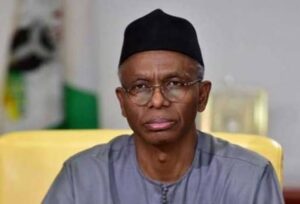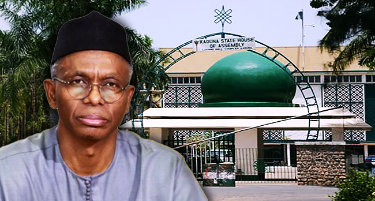A Federal High Court sitting in Kaduna State has adjourned the case filed by former governor Nasir El-Rufai against the State House of Assembly and the Attorney General of the State to July 17th. El-Rufai is contesting a report from the House committee that accuses him of corruption during his tenure as governor.
The hearing commenced on Monday, with significant developments as counsel to the first respondent, the Kaduna State House of Assembly, Sani Katu, SAN, informed the court of their intention to file a notice of preliminary objection. They are challenging the court’s jurisdiction to hear the case, arguing that the case may not fall under the purview of the Federal High Court.
Katu requested an extension of time to file all necessary applications regarding the case brought against his client by Nasir El-Rufai. This plea for more time was echoed by the Commissioner of Justice and Attorney General of Kaduna State, Sule Shauaibu, SAN, who is also a defendant in the case. They both emphasized the need for sufficient time to prepare and submit their applications.
On the other side, counsel to the applicant, Sule Umoru, did not oppose the request for an extension of time. This cooperative stance helped to facilitate the court’s decision. After considering all submissions, the presiding judge, Justice R.M. Aikawa, granted the adjournment. The case is now set to continue on July 17th, 2024, giving the respondents ample time to file their applications, including those addressing the substantive issues raised by El-Rufai.
 Former Governor Nasir El-Rufai initiated this legal battle on June 26th, challenging the Kaduna State House of Assembly’s probe report. The report indicted him for corruption during his eight-year administration. El-Rufai’s case centers on claims that the report violates his constitutional right to a fair hearing. He asserts that he was not given the opportunity to defend himself against the allegations, as he was never invited by the House to present his side of the story.
Former Governor Nasir El-Rufai initiated this legal battle on June 26th, challenging the Kaduna State House of Assembly’s probe report. The report indicted him for corruption during his eight-year administration. El-Rufai’s case centers on claims that the report violates his constitutional right to a fair hearing. He asserts that he was not given the opportunity to defend himself against the allegations, as he was never invited by the House to present his side of the story.
El-Rufai’s legal team is pushing for the court to declare the Assembly’s report null and void, arguing that the process was fundamentally flawed and unjust. The former governor maintains that the report is not only biased but also lacks due process, undermining his right to a fair trial as stipulated in the Nigerian Constitution.
The forthcoming hearing on July 17th is anticipated to be a critical juncture in this legal dispute. It will determine whether the Federal High Court has the jurisdiction to hear the case and whether El-Rufai’s claims hold sufficient merit to overturn the House committee’s findings. The outcome could have significant implications for the political landscape in Kaduna State, especially considering El-Rufai’s prominent role in the state’s governance over the past eight years.
As the legal proceedings unfold, the case continues to draw public attention, highlighting issues of accountability, governance, and the rule of law. Observers are keenly watching to see how the judiciary will handle the complex interplay of legal and political factors in this high-stakes case.




